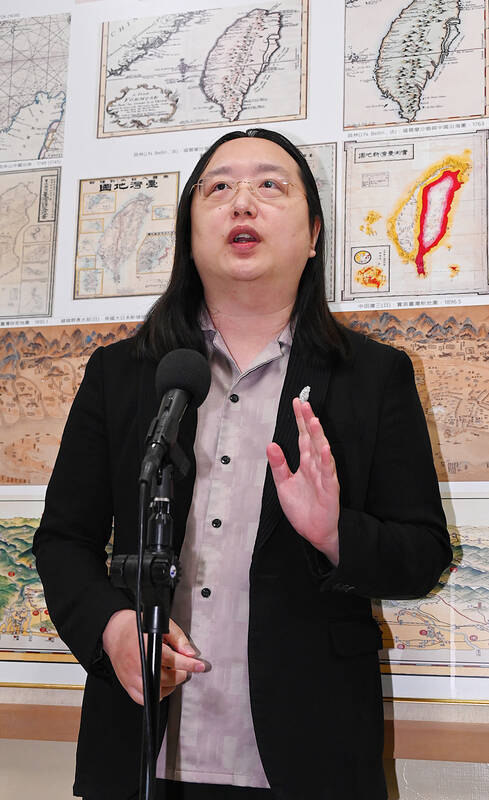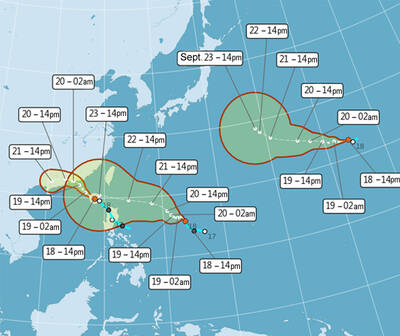The government would be authorized by law to regulate TikTok and other large online advertising platforms following amendments to the Cyber Security Management Act (資通安全管理法), Minister of Digital Affairs Audrey Tang (唐鳳) said yesterday, adding that the amendments would soon be reviewed by the Executive Yuan before they are deliberated in the legislature.
Tang was invited to attend a meeting of the legislature’s Transportation Committee to brief lawmakers about the Ministry of Digital Affairs’ (MODA) performance.
Democratic Progressive Party (DPP) Legislator Lin Chun-hsien (林俊憲) asked Tang whether the ministry has plans to address harms caused by the use of TikTok.

Photo: Liu Hsin-de, Taipei Times
Before the presidential and legislative elections on Jan. 13, TikTok worked with the Central Election Commission to take down videos created to mislead voters or influence outcomes, Lin said.
Many videos on the platform claimed that the elections were rigged, attempting to cast doubt on the validity of the results and undermine the legitimacy of Taiwan’s democracy, Lin said.
Aside from false information, the platform is also filled with hazardous content, including fraud, child pornography, schoolyard bullying and the sale of fake products, drugs and guns, Lin said.
“Our younger generation is being destroyed by TikTok. Some have learned from watching the platform to upload videos of them bullying their friends. In December last year, a supermarket in Taoyuan was severely damaged by a fire started by three young people, who reportedly accepted a TikTok challenge by making blowtorches using a cigarette lighter and aerosol spray,” he said.
Tang said that TikTok is not just an online advertising platform and has been listed by the government as a “hazardous product,” meaning that it can be fully controlled by a hostile regime.
The amendments to the act would allow the government to regulate such products, she said.
Large online advertising platforms are regulated by the Ministry of Economic Affairs, but it has agreed to transfer that authority to the MODA, Tang said.
Tang on the sidelines of the meeting told reporters that the MODA would regulate the use of hazardous products, particularly in government agencies.
The amendments state that Administration for Cyber Security under MODA would be the agency in charge of enforcing the act.
Meanwhile, government agencies would be banned from procuring or using cybersecurity products that would endanger national security, the amendments say.
“However, government agencies would not be breaking procurement regulations if the products were purchased before the discovery that they were owned or controlled by a hostile regime. The use of the products would be terminated,” she said.
“Gadgets or devices allocated to officials to conduct government matters are considered part of government facilities, in which installation, downloading or using of hazardous products are forbidden,” Tang said.
Chinese Nationalist Party (KMT) Legislator Lu Ming-che (魯明哲) said that the MODA failed to curb fraud last year.
The number of fraud cases was generally below 30,000 each year from 2019 to 2022, Lu said, citing Criminal Investigation Bureau data.
However, within one year after the MODA was established in August 2022, the number of scam cases rose about 30 percent from 29,500 in 2022 to about 38,000 last year, he said.
About 60 percent of people in Taiwan receive a scam call or see a fraudulent advertisement at least once a week, Lu said.
Victims in Taiwan are able to recover losses only in 13.9 percent of fraud cases, far lower than other countries, he said, citing data from the Global Anti-Scam Organization.
The problem would only deteriorate if it is not tackled at the source, Lu said.
Tang said that the ministry has made progress in curbing fraud ads on e-commerce platforms, with none of them being listed on the government’s 165 anti-fraud network.
However, the significant increase over the past year could be attributed to the rapid development of generative artificial intelligence, which makes it easy for one person to impersonate more than 100 people at a time, she said.
“We hope the amendments to the Electronic Signature Act (電子簽章法) would be quickly passed in the legislature so that it becomes more difficult to impersonate others,” Tang said.

NEW AGREEMENT: Malaysia approved imports last year after nearly two years of negotiations and inspections to meet quarantine requirements, officials said Up to 3.6 tonnes of pomeloes from Taiwan cleared Malaysian customs on Friday, in the first shipment of Taiwanese pomeloes to Malaysia. Taiwan-grown pomeloes are popular in domestic and overseas markets for their tender and juicy taste, the Ministry of Agriculture’s Animal and Plant Health Inspection Agency said. The fruit is already exported to Japan, Canada, Hong Kong, Singapore and the Philippines, it added. The agency began applying for access to the Malaysian market in 2023, compiling data on climate suitability, pests and diseases, and post-harvest handling, while also engaging in nearly two years of negotiations with Malaysian authorities and submitting supplementary

PEAK MONTHS: Data showed that on average 25 to 27 typhoons formed in the Pacific and South China seas annually, with about four forming per month in July and October One of three tropical depressions in the Pacific strengthened into a typhoon yesterday afternoon, while two others are expected to become typhoons by today, Central Weather Administration (CWA) forecaster Lee Ming-hsiang (李名翔) said yesterday. The outer circulation of Tropical Depression No. 20, now Typhoon Mitag, has brought light rain to Hualien, Taitung and areas in the south, Lee said, adding that as of 2pm yesterday, Mitag was moving west-northwest at 16kph, but is not expected to directly affect Taiwan. It was possible that Tropical Depression No. 21 would become a typhoon as soon as last night, he said. It was moving in a

Tigerair Taiwan and China Airlines (CAL) today announced that several international flights were canceled or rescheduled due to Typhoon Ragasa. The Central Weather Administration (CWA) has maintained sea and land warnings for the typhoon. Its storm circle reached the Hengchun Peninsula (恆春半島) on Taiwan's southern tip at 11am today. Tigerair Taiwan said it canceled Monday's IT551/IT552 Taoyuan-Da Nang, IT606/IT607 Taoyuan-Busan and IT602 Taoyuan-Seoul Incheon flights. Tomorrow, cancelations include IT603 Seoul Incheon-Taoyuan, as well as flights between Taoyuan and Sapporo, Osaka, Tokyo Narita, Okinawa, Fukuoka, Saga, Tokyo Haneda, Nagoya, Asahikawa and Jeju. On Wednesday, the IT321/IT322 Kaohsiung-Macau round-trip would also be canceled. CAL announced that today's

About nine Taiwanese are “disappeared,” detained, or otherwise deprived of freedom of movement in China each month, the Mainland Affairs Council (MAC) said yesterday. Between Jan. 1 last year and Aug. 31 this year, 188 Taiwanese travelers went missing, were detained and interrogated, or had their personal freedom restricted, with some questioned in airports or hotel lobbies, the council said. In a statement ahead of the Mid-Autumn Festival, the council urged people visiting China for any reason to be highly vigilant and aware of the risks. Of the reported cases, 50 people were “disappeared” after entering China, 19 were detained and 119 had